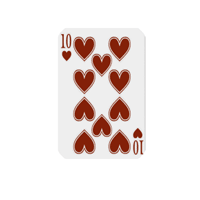Suited connectors like 5h-6h or 9s-10s can be fun to play, especially when you hit a big flop and make a straight or a flush. While these hands certainly have a lot of potential, you'll need to be careful that you don't bleed your stack to death by playing them in the wrong situations.
So, when is the right time?
It's best to play these hands from late position rather than early position.
Every Hold'em poker book beats you over the head with constant reminders that position is power. Well, let me beat you with that reminder one more time.
Here are some strategies for playing suited connectors from both in and out of position.
Let's say you call a small pre-flop raise in position with 6h-7h. The flop comes Jh-9s-4h. It's just you and the raiser, and he checks. In this case, with position, you have two viable options: check and take the free card, or bet in the hopes of winning the pot on a semi-bluff.
You'll often want to check, just in case your opponent is trying to trap you on the flop. If you do bet, your opponent may come over the top with a big raise, forcing you to fold your drawing hand.
How about if your opponent bets the flop?
Once again, you have options. You can fold if the bet is too big, you can call and hope to catch your flush, or you can raise as a semi-bluff.
The situation is reversed when you're out of position and your opponent acts last. Now, you're options are much more limited.
Remember this rule: In order to make money with hands like 6h-7h, you need to be able to control the pot size. You don't want to invest too much money before the flop, or too much after, when you have a drawing hand.
When you're out of position, you're in exactly that spot and have less control of the pot size.
If you check on the flop, your opponent will bet if he has a strong hand. If you call on the flop, you've essentially handed over control to him. That's not a terrible idea, mind you, as you should always respect your opponent's power of position.
Still, checking and calling won't put you in a great situation. It will be difficult for you to win this pot with a bluff later in the hand; you're basically banking on making the flush.
What if, on the flop, you check-raise instead?
That'll work when your opponent is bluffing, but it will cost you a lot more money when he's holding the goods. It's a risky move that often works, but the cost is very high when it doesn't.
Suppose you bet the flop as a semi-bluff?
That only makes the pot bigger. If your opponent likes the flop, he'll just raise an amount so big that you'll be forced to fold your draw without ever getting to see the next card.
Okay, let's review.
In position, you have the luxury of being able to see more free cards, keep the pot small, and maintain control of the hand. That's extremely valuable leverage. Out of position, there's a lot more guesswork to do, and it's best to simply play it safe.
Clearly, it's easier to play suited connectors, or any hand for that matter, from late position. Occasionally, though, play your suited connectors from early position so that you don't become too predictable.
When you do venture in, play cautiously, and always remember that position is king and must be respected at all times.
Daniel Negreanu
Saturday, January 20, 2007
Subscribe to:
Post Comments (Atom)









No comments:
Post a Comment